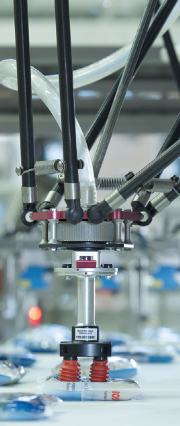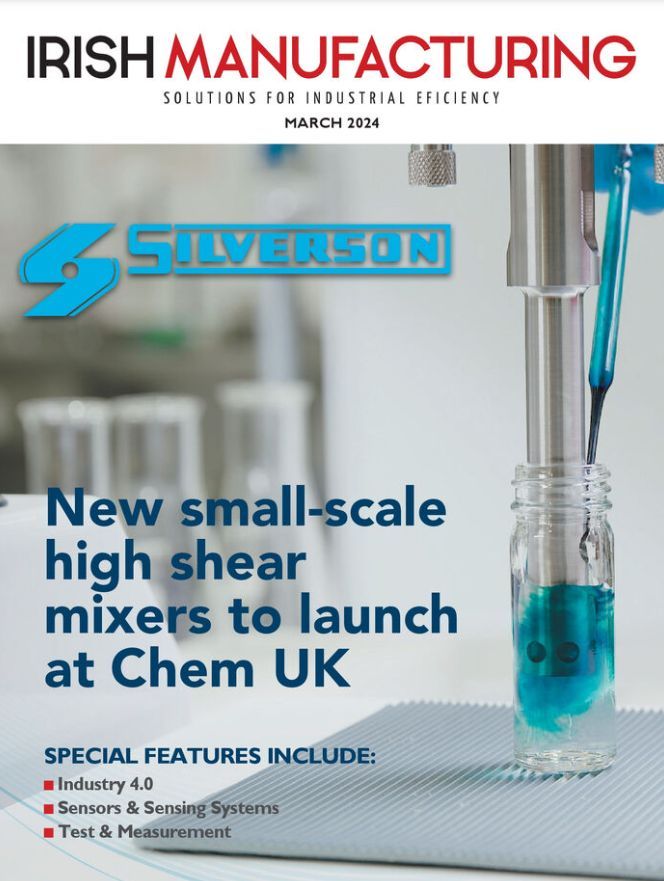 While many sectors are still afflicted by the effects of the recession, the demand for fresh food has risen steadily. Companies looking to meet this demand are searching for innovations in the packaging and processing of fresh products. Roy Fraser, Bosch Packaging Technology product manager robotics, says one such innovation that is becoming significantly popular within the fresh produce industry is the integration of robotics into packaging lines
While many sectors are still afflicted by the effects of the recession, the demand for fresh food has risen steadily. Companies looking to meet this demand are searching for innovations in the packaging and processing of fresh products. Roy Fraser, Bosch Packaging Technology product manager robotics, says one such innovation that is becoming significantly popular within the fresh produce industry is the integration of robotics into packaging lines
In the current climate, fresh produce packers are particularly focused on reducing direct costs, or cost-per-unit, and on enhancing their scale-up capabilities. To this end robots are highly beneficial in three specific ways: boosting flexibility, facilitating the redeployment of staff, and standardising packaging solutions across different locations.
In order to achieve the high mix/low volume output that today’s market trends demand, flexibility is absolutely vital. Fresh food producers require the ability to adapt their packaging line quickly and easily to meet the needs of the day – to ramp production up or down, and to facilitate rapid changeover between different products that appeal to different regions or demographics. The flexibility of advanced automation solutions allows manufacturers to more easily increase and decrease output as demand fluctuates compared with manual labor.
Automation reduces the burden on fresh food packaging plant personnel, and allows companies to utilise employees’ skills in more high-value ways. A reduction in the need for human interaction with the packaging line also enables companies to achieve higher safety and hygiene standards – satisfying strict regulators by reducing potential sources of contamination.
Finally, standardisation gives global companies with plants in different locations the ability to achieve across-the-board consistency, regardless of where their products are being packaged. Maintaining consistent product quality on packaging lines within one plant or at different facilities is no easy task. However, robotic solutions can help to realise this. Ensuring product quality across the entire business can provide a real boost to consumer loyalty, and hence lead to increased sales.
Delta Robotics
Delta robots are known for their speed and high flexibility. Today Bosch Packaging Technology has over 3,000 Delta robots for the packaging industry in service. Speed and flexibility remain key; but this is far from the entire sum of the advantages said to be on offer.
Simple
The most advanced software packages allow manufacturers to run a simulation of their lines and processes on a touchscreen display called a human machine interface (HMI) without using any physical product. The information this provides shortens line setup times, reduces downtime and removes a source of product waste – an inevitable consequence of trial runs where actual product is used. The 3D view enables operators to adjust and optimise pick-and-place patterns and other settings for each product – perfect for fresh food producers who must be flexible in their packaging operations to meet changing retailer and consumer needs. Whether changing pack size and style, accommodating multipacks or adding convenience, fresh food producers have to be able to change their operations easily and quickly.
Fast
The latest developments in Delta robot technology allow increases in acceleration of up to 50 per cent. Producing more output with a given technology serves to quickly reduce total cost of ownership (TCO). Delta robotics can speed up changeover between products allowing consistent quality, shorter set-up times and quicker, more frequent deliveries, which ultimately results in better customer service. Format changes can be carried out without tools, reducing operating costs and allowing for quick changeovers that reflect the growing need to adapt to retailer and consumer demands.
The DD23 robot from Bosch Packaging Technology has directly servo-driven arms. The arms are mounted directly on the motor, which eliminates the need to have gearboxes. This reduces maintenance, leading to less downtime and an increase in overall equipment effectiveness, while also increasing machine speed. This robot is suitable for fresh food producers who want to increase output within a still conservative investment climate.
 Precise
Precise
In a flexible manufacturing environment, robots need to be able to handle different products. Bosch’s large portfolio of end effectors, ranging from mono- and multipick to reflex grippers, can be utilised depending on the product being handled. Vacuum, mechanical and Coanda end effectors, with or without rotations, ensure gentle and reliable product handling leading to lower volumes of damaged and rejected product.
Complete
Truly complete solutions allow fresh food producers the convenience of one-stop-shopping, providing standardised controllers, common software, hardware and spare parts. TCO is brought down by virtue of reduced maintenance and downtime, the ability to run lines at higher output with a smaller number of devices and lower inventory levels. Through complete robotic solutions, packaging line experts give companies the opportunity to resolve all manufacturing needs in one go.
For both primary and secondary packaging, standardised lines with Delta robots can produce cost-saving benefits. When a single supplier is able to supply common components, those benefits include risk reduction; streamlined maintenance and repairs, decreased scalability expenses and lower technology training costs.
All in One
For small and large fresh food producers, looking to cement their market position or set their sights on new horizons, Delta robotic solutions may just be the manufacturing boost they need.
Bosch Packaging Technology
T:+41 (0)21 6442500


